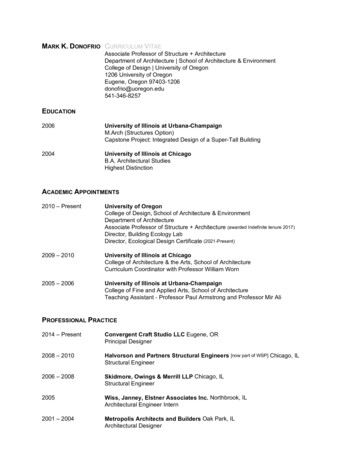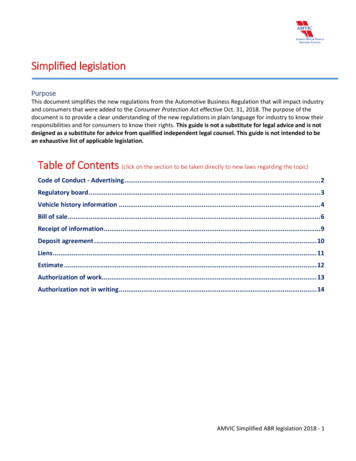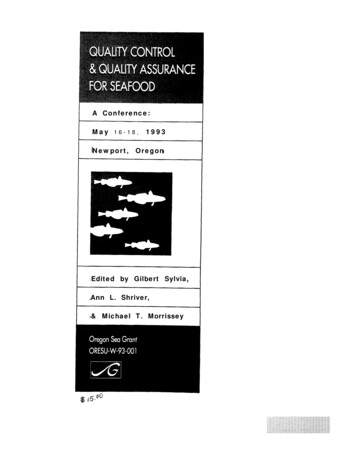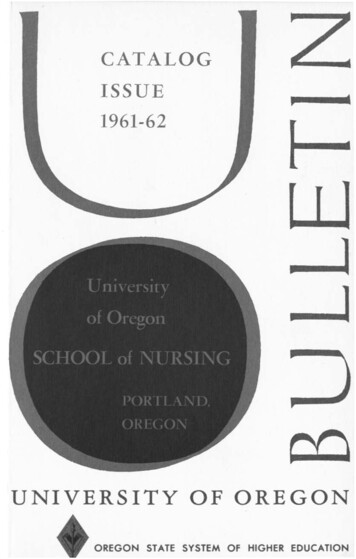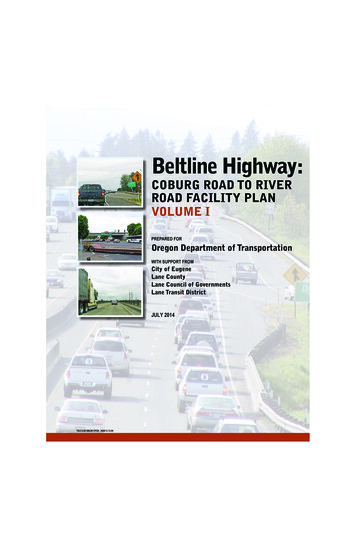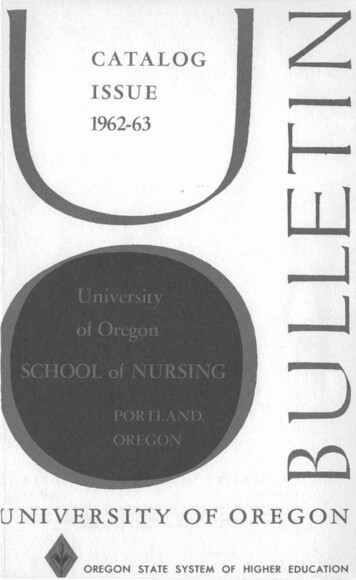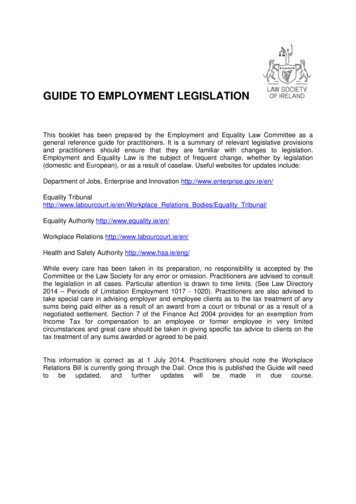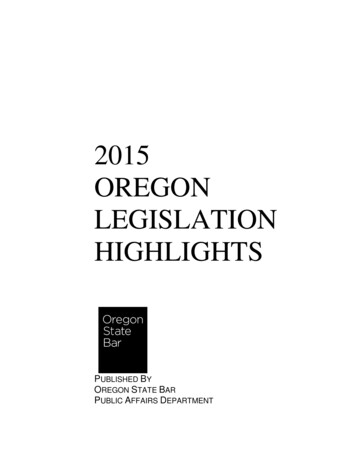
Transcription
2015OREGONLEGISLATIONHIGHLIGHTSPUBLISHED BYOREGON STATE BARPUBLIC AFFAIRS DEPARTMENT
Most bills passed during the 2015 sessionhave special effective dates. These dates arenoted in the description of each bill.If a special effective date is not proscribed in abill, it takes effect on January 1, 2016.This handbook may be cited as:2015 Oregon Legislation HighlightsThis publication is not copyrighted.Published in the United States of America
Special Thanks to2015 OREGON LEGISLATION HIGHLIGHTS EDITORMARISA JAMESOffice of Legislative CounselSalemOREGON STATE BAREXECUTIVE DIRECTORSylvia E. Stevens2015 OREGON LEGISLATION HIGHLIGHTSPRODUCTION STAFFMatt Shields – Editor in ChiefSusan Evans GrabeAmy ZubkoAmanda Lunsford
FORWARDThe annual Oregon Legislation Highlights offers a timely and authoritativeresource to help lawyers catch up on the latest legislative developments.This book highlights more than 350 bills and other measures that were passed byboth houses of the legislature. This book does not describe all of the enacted legislation.Unless otherwise noted, all legislation takes effect on January 1, 2016.The information in this book is organized into chapters by subject. If a bill has aspecial effective date, that date is noted at the end of the discussion of that bill. Pleasenote that in some cases a bill may have more than one effective date. If in doubt about aneffective date of a law, always check the enacting legislation.Each bill is identified – in the chapter outline and in the text – by its bill numberand its 2015 Oregon Laws chapter number. A table of bill numbers and Oregon Lawschapter numbers appears at the end of the book for a quick reference to the discussion inthe text.The legislature’s website offers additional information that the reader of this bookmay find useful. This includes measure summaries written by legislative staff, and insome cases supporting documentation submitted during committee hearings. Seewww.oregonlegislature.gov for more information.We are grateful to all who were involved in preparing this book. We areappreciative of the efforts of our volunteer authors, who take time away from theirpractices to contribute to this publication.We would also like thank the staff of the Oregon Office of Legislative Counsel,both for their volunteer assistance editing and reviewing this publication, and for theirongoing support of the Oregon State Bar.
2015 Oregon Legislation HighlightsTABLE OF CONTENTSADMINISTRATIVE LAW . 1-1INTRODUCTION . 1-5GOVERNMENTAL ETHICS . 1-5MEDICAL AND HEALTH AGENCIES, BOARDS, AND COMMISSIONS . 1-8EDUCATION . 1-18DEPARTMENT OF ADMINISTRATIVE SERVICES . 1-21LANDSCAPE CONTRACTING . 1-24DEPARTMENT OF HUMAN SERVICES . 1-26STATE MORTUARY AND CEMETERY BOARD . 1-27DEPARTMENT OF CONSUMER AND BUSINESS AFFAIRS . 1-28VETERINARY BOARD . 1-30SECRETARY OF STATE . 1-31ENERGY . 1-32DEPARTMENT OF JUSTICE . 1-33KLAMATH BASIN ADJUDICATION . 1-34MISCELLANEOUS . 1-35ATTORNEY REGULATION & JUDICIAL ADMINISTRATION . 2-1INTRODUCTION . 2-2BAR REGULATION . 2-2COURT OPERATIONS . 2-4OTHER LEGISLATION . 2-5CIVIL PROCEDURE . 3-1INTRODUCTION . 3-3CHANGES TO THE UNIFORM TRIAL COURT RULES . 3-3CHANGES TO THE OREGON RULES OF CIVIL PROCEDURE . 3-5OTHER LEGISLATIVELY ENACTED CHANGES . 3-10COMMERCIAL, CONSUMER & DEBTOR-CREDITOR LAW . 4-1INTRODUCTION . 4-3MORTGAGES, FORECLOSURES, AND FINANCING STATEMENTS . 4-3CONSUMER PROTECTION . 4-5BUSINESS ENTITIES . 4-9CONSTRUCTION LAW . 5-1INTRODUCTION . 5-3LICENSING . 5-3CONSTRUCTION CLAIMS . 5-5PUBLIC CONTRACTING . 5-6
CRIMINAL LAW . 6-1INTRODUCTION . 6-4FIREARMS . 6-4SEX CRIMES . 6-8OTHER DESIGNATED CRIMES . 6-12IGNITION INTERLOCK DEVICES . 6-14PRETRIAL RELEASE, SENTENCING AND POST CONVICTION. 6-16COURT PROCEDURES AND FAPA REQUIREMENTS. 6-22DOMESTIC RELATIONS . 7-1INTRODUCTION . 7-3ADMINISTRATIVE SUPPORT PROCEEDINGS . 7-3ADOPTIVE PROCEEDINGS . 7-5DOMESTIC VIOLENCE ISSUES. 7-7OTHER DOMESTIC RELATIONS BILLS . 7-9ESTATE PLANNING & ELDER LAW . 8-1INTRODUCTION . 8-2ELDERS AND OTHER VULNERABLE PERSONS . 8-2PROTECTIVE PROCEEDINGS . 8-4STATE RECOVERY OF FUNDS . 8-5OTHER LEGISLATION . 8-6ENERGY & SUSTAINABILITY . 9-1INTRODUCTION . 9-2ENERGY AND SUSTAINABILITY . 9-2FINANCIAL INSTITUTIONS . 10-1INTRODUCTION . 10-2FINANCIAL INSTITUTION GOVERNANCE. 10-2DEPOSIT ACCOUNTS . 10-3LENDING . 10-5FINANCIAL RECORDS AND INFORMATION . 10-10MISCELLANEOUS . 10-11HEALTH LAW . 11-1INTRODUCTION . 11-5HEALTH CARE PROFESSIONALS . 11-5HOSPITALS AND HEALTH CARE FACILITIES. 11-15INSURANCE . 11-19MEDICAID AND OTHER PUBLIC HEALTH CARE PROGRAMS . 11-28PUBLIC HEALTH . 11-30OTHER LEGISLATION . 11-34
JUVENILE LAW . 12-1INTRODUCTION . 12-2DELINQUENCY BILLS . 12-2DEPENDENCY BILLS . 12-4LABOR AND EMPLOYMENT LAW. 13-1INTRODUCTION . 13-3EMPLOYEE LEAVE LAWS . 13-3CIVIL RIGHTS LAWS . 13-6WAGES AND PAYMENTS OF WAGES. 13-8UNEMPLOYMENT INSURANCE AND BENEFITS . 13-9WORKERS’ COMPENSATION . 13-10MISCELLANEOUS EMPLOYMENT LAWS. 13-10LAND USE . 14-1INTRODUCTION . 14-2SPECIAL DISTRICTS . 14-2CITY OF DAMASCUS . 14-3SUBMERGED LANDS . 14-4PROCEDURAL RULES AND REQUIREMENTS . 14-4REAL PROPERTY . 15-1INTRODUCTION . 15-2MORTGAGES, FORECLOSURES, CONVEYANCES, AND RECORDING . 15-2HOUSING . 15-4PROPERTY TAXES . 15-6OTHER BILLS . 15-7TAXATION LAW . 16-1INTRODUCTION . 16-4INCOME TAX . 16-4INCOME TAX CREDITS . 16-6PROPERTY TAX ADMINISTRATION . 16-8CENTRAL ASSESSMENT CHANGES . 16-12PROPERTY TAX EXEMPTIONS . 16-13CONNECTION TO FEDERAL LAW. 16-16TAX COMPLIANCE AND COLLECTIONS . 16-17OTHER TAX LEGISLATION . 16-17
1Matt BarberJudy ParkerAdministrative LawI. INTRODUCTIONII. GOVERNMENTAL ETHICS1. HB 2019(Ch. 619)2. HB 2058(Ch. 813)3. SB 294(Ch. 666)Government Ethics CommissionLobbyist ExpensesRulesIII. MEDICAL AND HEALTH AGENCIES, BOARDS, AND COMMISSIONS1. SB 696(Ch. 674)Behavior Analysis Regulatory Board2. HB 2307(Ch. 79)Conversion Therapy Prohibition3. SB 699(Ch. 794)Cosmetology4. HB 2296(Ch. 56)Electrologists and Body Art Practitioners5. HB 2642(Ch. 722)Esthetcians6. SB 684(Ch. 582)Limited Physician Licenses7. SB 298(Ch. 491)Massage Therapy, Bodywork8. SB 840(Ch. 461)Medical Board: Definitions9. SB 905(Ch. 403)Medical Board: Membership10. SB 280(Ch. 385)Medical Imaging Board11. HB 2796(Ch. 632)Music Therapy12. SB 281(Ch. 173)Naturopathic Medicine Board13. HB 2930(Ch. 63)Nurse Practitioner Privileges14. SB 547(Ch. 353)Nurse Emeritus15. HB 2028(Ch. 362)Pharmacy Board: Clinical Pharmacy16. SB 148(Ch. 284)Pharmacy Board: Composition17. HB 2305(Ch. 78)Polysomnographic Technologists18. HB 2306(Ch. 467)OHA: Filling Prescriptions19. HB 3230(Ch. 740)OHA: Housing20. HB 2413(Ch. 241)OHA: Residential Facilities21. HB 2300(Ch. 819)OHA: Terminal Disease Treatment22. HB 2230(Ch. 621)OHA: Veterans1-1
ADMINISTRATIVE LAW23. SB 430(Ch. 611)24. SB 287(Ch. 271)IV. EDUCATION1. HB 28702. HB 33393. HB 33714. SB 805. SB 83(Ch. 726)(Ch. 479)(Ch. 434)(Ch. 767)(Ch. 279)Sanctions Against Psychologist Examiners, SocialWorkers, Professional CounselorsSpeech-Language PathologyStudent ComplaintsTeacher Leader LicensesStudent RetaliationOregon University System and State Board ofHigher EducationTeaching License RequirementsV. DEPARTMENT OF ADMINISTRATIVE SERVICES1. HB 2250(Ch. 758)Fingerprint Capture2. HB 2255(Ch. 622)Supervisory Employees3. HB 2476(Ch. 30)Rulemaking4. HB 3099(Ch. 807)Enterprise InformationVI. LANDSCAPE CONTRACTING1. HB 3304(Ch. 652)2. SB 520(Ch. 295)3. SB 580(Ch. 672)Practical SkillsLandscape Contractors BoardLandscape Contractors LawVII. DEPARTMENT OF HUMAN SERVICES1. HB 2219(Ch. 195)Application Process2. HB 2233(Ch. 706)Adult Abuse Prevention3. SB 307(Ch. 839)Retirement CommunityVIII. STATE MORTUARY AND CEMETERY BOARD1. HB 2471(Ch. 367)Criteria2. HB 2472(Ch. 516)Self-Inspection3. HB 3242(Ch. 430)Temporary Operating PermitsIX. DEPARTMENT OF CONSUMER AND BUSINESS AFFAIRS1. HB 2211(Ch. 194)Service Companies2. SB 1(Ch. 3)Health Insurance Exchange Abolition3. SB 277(Ch. 118)Check-Cashing Business Licenses1-2
ADMINISTRATIVE LAWX. VETERINARY BOARD1. HB 2474(Ch. 628)2. HB 2475(Ch. 418)Veterinary Facility, Advisory CommitteeFinesXI. SECRETARY OF STATE1. HB 2174(Ch. 29)2. HB 2175(Ch. 17)Municipal CorporationsFinancial StatementsXII. ENERGY1. HB 21872. HB 2193PlanningPublic Utility Commission(Ch. 311)(Ch. 312)XIII. DEPARTMENT OF JUSTICE1. HB 3476(Ch. 265)2. SB 189(Ch. 114)Victim DisclosureConfidentialityXIV. KLAMATH BASIN ADJUDICATION1. SB 206(Ch. 445)2. SB 264(Ch. 449)Transfer or Lease of Klamath Basin Water RightsOregon Water Resources DepartmentXV. MISCELLANEOUS1. SB 2722. HB 24733. HB 22504. HB 22085. SB 5746. HB 35497. HB 30378. HB 24399. SB 29710. HB 220711. HB 253412. HB 228813. HB 3214(Ch. 451)(Ch. 106)(Ch. 758)(Ch. 313)(Ch. 498)(Ch. 833)(Ch. 26)(Ch. 69)(Ch. 576)(Ch. 704)(Ch. 61)(Ch. 196)(Ch. 477)14. SB 120(Ch. 280)15. HB 257116. HB 348717. HB 3318(Ch. 550)(Ch. 226)(Ch. 478)Board of AccountancyBoard of Licensed Social WorkersJudicial Department EmploymentCivil Code Enforcement Officers DisclosureConstruction Contractors BoardDepartment of AgricultureDisclosure ExemptionsEmployment DepartmentEngineering and SurveyingEnvironmental Quality CommissionFish and Wildlife CommissionInnovation CouncilLand Conservation and Development Commission:Statewide PlanningLand Conservation and Development Commission:Transportation Improvement RulesLaw Enforcement AgenciesLicensed InvestigatorsLottery Commission1-3
ADMINISTRATIVE LAW18. HB 349819. SB 38620. HB 354921. HB 227022. HB 296023. SB 93424. HB 218425. SB 49426. HB 288627. SB 253(Ch. 438)(Ch. 14)(Ch. 833)(Ch. 762)(Ch. 557)(Ch. 589)(Ch. 54)(Ch. 455)(Ch. 111)(Ch. 383)Marine BoardOHSUPesticide Analytical and Response CenterResilience OfficerRetirement Savings BoardState Fair CouncilTransportation: Parks and RecreationTransportation: VeteransVehicle DealersVeteran Personally Identifiable InformationMatt Barber: 2004 Willamette University School of Law. Member of the Oregon State Barsince 2005.Judy Parker: 2006 Willamette University School of Law. Member of the Oregon State Barsince 2006.1-4
ADMINISTRATIVE LAWI.INTRODUCTIONThis chapter covers legislation effecting a variety of state agencies, especially includingagency rulemaking requirements, and is generally organized by agency or topic area.Additionally the chapter contains bills relating to the Office of Administrative Hearings, and togovernmental ethics including lobbying and the Government Standards and PracticesCommission. Unless otherwise stated, all bills take effect on January 1, 2016.II.1.HB 2019(Ch. 619)GOVERNMENTAL ETHICSGovernment Ethics CommissionHB 2019 took effect on July 1, 2015, and made changes to the size, composition, andprocedures of the Oregon Government Ethics Commission (Commission).The bill amended ORS 244.250 (2013) to increase the number of members serving onthe Commission from seven to nine, and correspondingly increased the quorum requirementfrom four to five members. The number of members appointed by the Governor upon therecommendation of the Democratic and Republican leaders in each house of the LegislativeAssembly has also increased, from four to eight. The number of members the Governor canappoint without a recommendation from legislative leadership has decreased from three toone, and the number of members who may be members of the same political party has alsodecreased, from four to three.The amendments to ORS 244.250 (2013) become operative on July 1, 2016.ORS 244.260(2) (2013) had required that the Commission provide notice of a complaintalleging a violation of ORS chapter 244 (2013) or a rule adopted pursuant to ORS chapter 244,or a motion to proceed without a complaint, by mail and telephone if the person could bereached by telephone. HB 2019 repealed the requirement that notice be provided by mail andtelephone. When providing notice of the complaint or motion, the Commission must includecopies of all materials that were submitted with the complaint, or that the Commission willconsider at the hearing on the motion.The responsibility for determining whether the conduct of a member of the LegislativeAssembly who is the subject of a complaint or motion involves conduct protected by Article IV,section 9, of the Oregon Constitution was transferred from the Commission to theCommission’s executive director.1-5
ADMINISTRATIVE LAWThe timeframe for conducting the Preliminary Review Phase to determine whetherthere is cause to undertake an investigation was reduced from 135 to 30 days. The Commissionand the person who is the subject of a complaint can no longer stipulate to a delay in excess ofthe allowed timeframe. If a candidate for elective office is the subject of a complaint, then thecandidate can request a delay in writing, and the Preliminary Review Phase must be completednot later than 30 days after the date of the election.The Preliminary Review Phase is confidential, as is any information that the Commissionconsiders before approving a motion to proceed on its own motion and related correspondenceregarding the motion or potential violation is confidential. HB 2019 amends ORS 244.260 (2013)to specifically include the Commission’s executive director along with the Commission’smembers and staff as being subject to a civil penalty, not to exceed 1,000, for violating theconfidentiality requirement.HB 2019 added a new paragraph (d) to ORS 244.260(3) (2013) concerning the conclusionof the Preliminary Review Phase. After completing the Preliminary Review Phase, the executivedirector must prepare a statement of facts with legal citations and relevant authorities. Legalcounsel must review the statement of facts before it can be presented to the Commission. Theexecutive director must attend an executive session of the Commission and present thestatement of facts, along with a summary of the results of the Preliminary Review Phase and arecommendation as to whether there is cause to undertake an investigation or whether theCommission should dismiss the complaint or rescind its motion. During the executive session,the Commission shall consider the executive director’s recommendation and make a finaldetermination as to whether there is cause to undertake an investigation or whether theCommission should dismiss the complaint or rescind its motion.If the Commission considers the executive director’s recommendations in an executivesession, but does not affirmatively vote to undertake an investigation, dismiss the complaint, orrescind its motion, the Commission’s nonaction shall be considered a dismissal of the complaintor a rescission of its motion.HB 2019 repealed ORS 244.260(4)(e)(A), which provided that the time limits establishedby ORS 244.260 and the Commission’s inquiry were suspended if there was a pending criminalinvestigation that related to the issues arising out of the matter under investigation orconsideration by the Commission.If the Commission makes a finding of cause to undertake an investigation andundertakes action in the Investigatory Phase, the timeframe for completing the InvestigatoryPhase is 180 days; however that can be suspended if there is a pending criminal investigationthat relates to the issues arising out of the matter under investigation or consideration by theCommission and the Commission determines that it cannot adequately complete itsinvestigation until the pending criminal investigation is completed.The amendments to ORS 244.260 apply to complaints filed on or after July 1, 2015.1-6
ADMINISTRATIVE LAWHB 2019 amended ORS 244.290, as amended by section 9d, chapter 877, Oregon Laws2007, and section 14, chapter 68, Oregon Laws 2009. The types of materials the Commissionmust make available online for public review has increased from just statements filed underORS 244.050 and 244.217 to include advisory opinions issued by the Commission or itsexecutive director, and findings issued by the Commission under ORS 244.260 after it hasdetermined that there has been a violation of a violation of ORS chapter 244 (2013) or a ruleadopted pursuant to ORS chapter 244.The amendments to ORS 244.290, as amended by section 9d, chapter 877, Oregon Laws2007, and section 14, chapter 68, Oregon Laws 2009 become operative on January 1, 2017.2.HB 2058(Ch. 813)Lobbyist ExpensesUnder ORS 171.745 (2013), as amended by section 1, chapter 701, Oregon Laws 2013,lobbyists registered or required to register with the Oregon Government Ethics Commissionmust file statements with the commission showing certain expenses incurred while lobbying.However, lobbyists are not required to report the amounts they spent lobbying anotherlobbyist. The exemption on reporting expenses incurred lobbying another lobbyist is repealedby section 2, chapter 701, Oregon Laws 2013, which became operative on June 30, 2015.HB 2058 would amend section 3, chapter 701, Oregon Laws 2013, to provide that theexemption on reporting expenses incurred lobbying another lobbyist would not becomeeffective until June 30, 2017. Additionally, the bill provides that if it does not become effectiveuntil after June 30, 2015, then it will apply retroactively to June 30, 2015, and the exemption insection 1, chapter 701, Oregon Laws 2013, will be revived and continue forward from that dateto the effective date of HB 2058.HB 2058 took effect on August 12, 2015.3.SB 294(Ch. 666)RulesSB 294 amends ORS 244.290 (2013) to authorize the Oregon Government EthicsCommission to adopt rules necessary to carry out its duties under ORS 192.660 and 192.685(2013). ORS 192.660 (2013) concerns executive sessions, and ORS 192.685 (2013) authorizesthe commission to investigate and respond to alleged violations of ORS 192.660 (2013).ORS 244.290 (2013), as amended by section 9d, chapter 877, Oregon Laws 2007, andsection 14, chapter 68, Oregon Laws 2009, is similarly amended.1-7
ADMINISTRATIVE LAWThe bill also amends ORS 192.660 (2013) to provide that, notwithstanding ORS 244.290,the commission may not adopt rules that establish which entities are consideredrepresentatives of the news media entitled to attend executive sessions.SB 294 has an effective date of January 1, 2016, and the amendments to ORS 192.660and 244.290 apply to alleged violations that occur on or after that date.III.1.MEDICAL AND HEALTH AGENCIES, BOARDS, AND COMMISSIONSSB 696(Ch. 674)Behavior Analysis Regulatory BoardSB 696 amends ORS 676.800, as amended by section 19, chapter 771, Oregon Laws2013, to increase the number of members on the Behavior Analysis Regulatory Board fromseven to nine. It increases number of members who must be licenses by the board from threeto four, requires that one of the newly added members must be a parent, guardian, or familymember of an individual diagnosed with autism spectrum disorder who has received some formof applied behavior analysis therapy, and replaces a previous requirement that one member bea licensed speech-language pathologist registered with the board with a new requirement thatone member be a licensed developmental pediatrician with experience or training in treatingautism spectrum disorder. Members are appointed by the Governor and must be confirmed bythe Senate.SB 696 has an effective date of July 6, 2015; however, sections 1, 3 to 5, 10 and 18 of thebill and the amendments to ORS 676.160, 676.583, 676.610, 676.613, 676.622, 676.800,676.805 and 676.992 and sections 2, 4 and 24, chapter 771, Oregon Laws 2013, by sections 2, 6to 9 and 11 to 16 of the bill become operative on November 1, 2015. The Governor, the HealthLicensing Office, and the board, are authorized to take any action before November 1, 2015,that is necessary to enable the Governor, the office, or the board to exercise all of the dutiesand responsibilities conferred on the Governor, the office, and the board on November 1, 2015.Sections 1 and 3 to 5 of the bill and the amendments to ORS 676.160, 676.583, 676.610,676.613, 676.622, 676.800, 676.805 and 676.992 and sections 2, 4 and 24, chapter 771, OregonLaws 2013, by sections 2, 6 to 9 and 11 to 16 of the bill apply to an individual licensed as abehavior analyst or assistant behavior analyst by the Behavior Analysis Regulatory Board orregistered as a behavior analysis interventionist by the Health Licensing Office on or afterNovember 1, 2015.2.HB 2307(Ch. 79)Conversion Therapy ProhibitionHB 2307 prohibits a mental health care or social health professional from practicing“conversion therapy”, a term defined in the bill, if the recipient is under 18 years of age. It alsomakes conforming amendments to OR
The annual Oregon Legislation Highlights offers a timely and authoritative . (Ch. 491) Massage Therapy, Bodywork 8. SB 840 (Ch. 461) Medical Board: Definitions 9. SB 905 (Ch. 403) Medical Board: Membership . 2006 Willamette University School of Law. Member of the Oregon State Bar since 2006. ADMINISTRATIVE LAW 1-5


